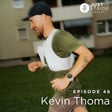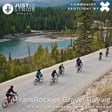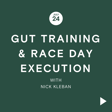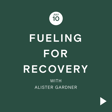
Fuel for Thought Series: Debunking Nutrition Myths with Alister Gardner
You may be asking yourself why this episode is titled “Fuel for Thought”. Any guesses?
I mean if you know me, you know I love a good old play on words, hence the name of this new series that I’ve produced with Xact Nutrition.
Athletes train for hours, work with coaches on technique, join workout groups and sign up for big challenges but one of the things we feel could be overlooked by athletes that is so critical, is education regarding nutrition and how it helps you perform.
So we’ve put together a multi episode series to discuss specific topics pertaining to just that, in hopes that you come away with more in depth knowledge and a better understanding of nutrition.
On this episode of Just In Stride, Fuel for Thought edition, we’ll debunk various nutrition myths, with Elite road and trail runner, Alister Gardner.
When it comes to nutrition and best practices, everyone has an opinion. Whether it’s using salt tabs, choosing between real food vs gels or bars, identifying an ideal race weight, fasting during workouts or using supplements, we’ll provide detailed explanations and discuss the importance of each one.
So no matter if you’re an elite or just starting out, you’ll certainly gain something from this conversation and that’s no myth.
Here are some of the key questions we cover:
-Does taking salt tablets prevent/stop cramping?
-Is supplementing with maltodextrin beneficial for endurance athletes?
-Is it better to fast or fuel before training?
-Does carb loading enhance race day performance?
-The lighter you are, the faster you’ll race.
-Real food is better than gels/bars
-------
Offer from Xact Nutrition: This episode is presented by our friends at Xact Nutrition and they are offering you 15% OFF your order when you use the code JUSTINSTRIDE. So head to xactnutrition.com and fuel your goals today! Now shipping in Canada and the U.S.
Thanks for tuning in to the Just In Stride Podcast. I truly appreciate you taking the time to listen and I hope you enjoyed that conversation as much as I did. Please take a minute after this to rate and review our show on Apple Podcasts. With your feedback we’ll be able to make the show even better and it’ll help us reach new listeners too. You can also find us on Instagram @justinstridepod and YouTube @justinstridepod for all the latest episodes and updates. Glad you came along for the ride with Just In Stride!



















